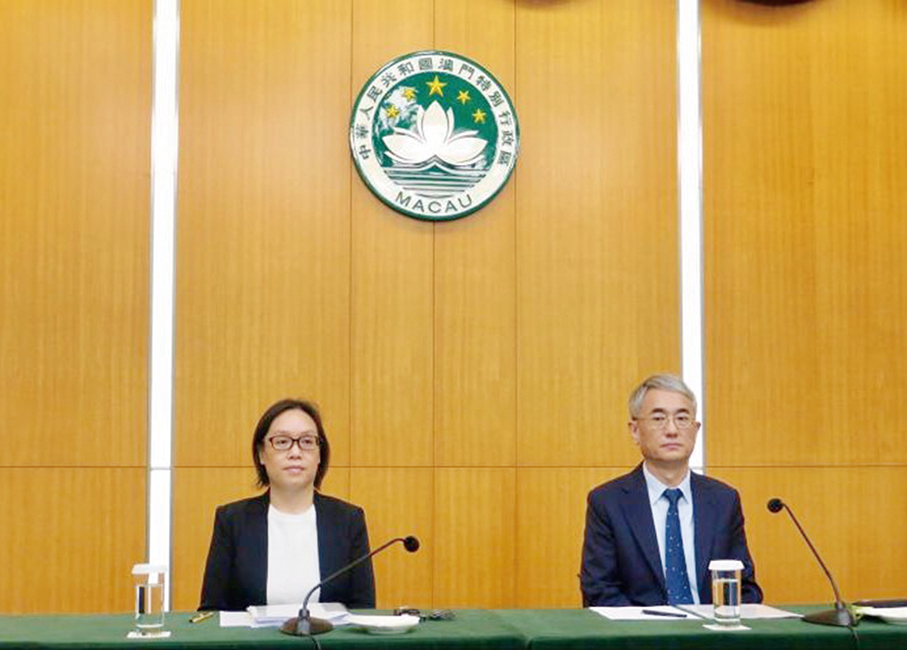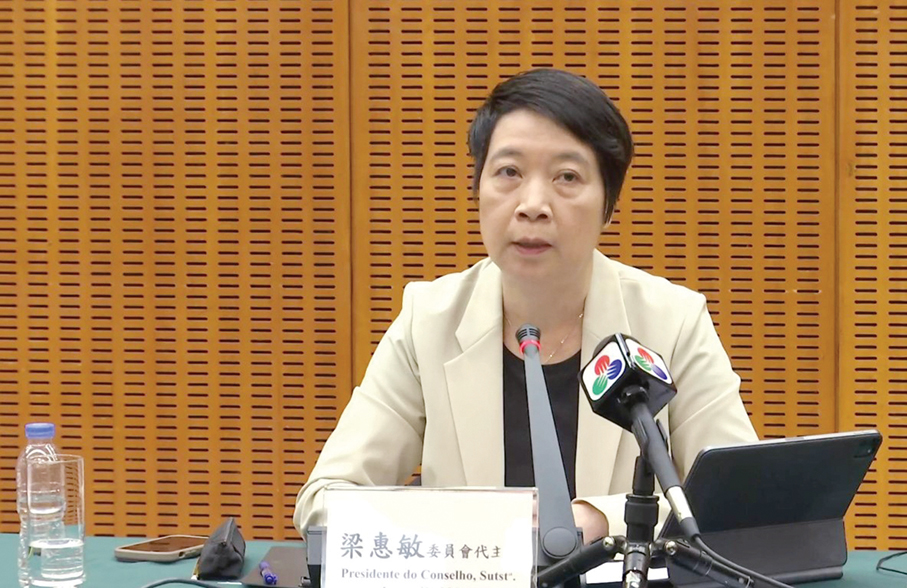The government has finished drafting legislation proposing that all officials and public servants will also be required to take an oath of office.
The proposed amendments are listed in a bill amending the current law regulating top officials and other officials of bureaus and other bureau-level entities, Law 15/2009, namely directors (or presidents), deputy directors (or vice-presidents), department chiefs, and division chiefs, as well as a bill amending the current regulation on public servants, i.e., the Macau Public Administration Staff Statute.
This comes after Macau’s amended oath-taking law took effect in May this year according to which members of the Chief Executive Election Committee are required to take an oath of office.
Secretary for Administration and Justice André Cheong Weng Chon, who is also the spokesman for the government’s top advisory Executive Council, announced the two amendment bills during a press conference at Government Headquarters on Friday. The two bills will be submitted to the Legislative Assembly (AL) in due course for debate, review and vote.
Before its amendments took effect on May 28 this year, the law regulating the oath-taking of those in the executive, legislative and judicial organs of the Macau Special Administrative Region (MSAR), Law 4/1999, covered the chief executive, principal officials, the president of the Legislative Assembly, the president of the Court of Final Appeal (TUI), the public prosecutor-general, members of the government’s top advisory Executive Council, legislators, judges, and prosecutors.
According to Article 50 of the MSAR Basic Law and the current structure of the local government, Macau’s principal officials comprise the government’s five policy secretaries, anti-graft commissioner, audit commissioner, head of the Unitary Police Service (SPU) and chief of the Macau Customs Service.
Amended national security law’s oath-taking requirements
However, according to the amended version of the MSAR’s national security law, which took effect on May 30 last year, the Chief Executive Election Committee members, all officials listed in Law 15/2009, and all public servants are also required to take an oath of office.
Consequently, the government submitted a bill amending the MSAR’s oath-taking law to the legislature early this year, namely the Law 4/1999 amendment bill which was passed by lawmakers in its final reading on May 21 and took effect on May 28, adding the Chief Executive Election Committee members to the law’s oath-taking requirements.
Consequently, the current, newly amended version of the MSAR’s oath-taking law covers the chief executive, principal officials, the president of the Legislative Assembly, the president of the Court of Final Appeal (TUI), the public prosecutor-general, members of the government’s top advisory Executive Council, legislators, judges, prosecutors, as well as the Chief Executive Election Committee members.
The Chief Executive Election Committee comprises 400 members, who are only required to take their oaths by signing a declaration, unlike all others in the MSAR’s executive, legislative and judicial organs who are required to take their oaths in person publicly, i.e., at a ceremony.
Cheong announced during Friday’s press conference that in compliance with oath-taking requirements listed in the amended local national security law, the government has drafted a bill amending Law 15/2009 as well as a bill amending the Macau Public Administration Staff Statute.
According to Cheong, the government proposes that officials listed in Law 15/2009 will be required to take their oaths at a ceremony, while public servants in general will only be required to take their oaths by signing a declaration.
The two amendment bills announced by Cheong propose that officials listed in Law 15/2009 and public servants in general must uphold the MSAR Basic Law and bear allegiance to the MSAR.
According to the MSAR’s oath-taking law, all those in the MSAR’s executive, legislative and judicial organs, including the 400 Chief Executive Election Committee members, must uphold the MSAR Basic Law and bear allegiance to the MSAR, but additionally, the chief executive, principal officials, the Legislative Assembly’s president, the Court of Final Appeal’s president, and the public prosecutor-general must also bear allegiance to the People’s Republic of China (PRC), which established the MSAR on December 20, 1999.
Refusal to take oath
As all those covered by the MSAR’s oath-taking law, i.e., Law 4/1999, the two amendment bills announced on Friday propose that officials listed in Law 15/2009 and public servants in general who refuse to take their oath of office shall be disqualified from taking office. More specifically, the government shall cancel the appointments of officials listed in Law 15/2009 who refuse to take their oath and terminate the employment of public servants who refuse to take their oath, according to Cheong.
Similar to the respective provisions listed in the MSAR’s amended oath-taking law, the two amendment bills propose that when taking one’s oath of office, those who intentionally read out words not complying with their oath’s respective terms, or sign a declaration in which the terms of the oath have been tampered with, will be regarded as refusing to take the oath.
According to Cheong, the two amendment bills also propose that those who take their oaths in a way that is insincere or unsolemn will also be regarded as refusing to take the oath, also similar to the amended Law 4/1999’s respective provisions.
The government proposes that officials listed in Law 15/2009 and public servants in general, i.e., those who have already taken office before the two pieces of future new legislation take effect, will also be required to take their oaths within a specified period of time of the amended legislation coming into force, according to Cheong.

Secretary for Administration and Justice André Cheong Weng Chon (right) and Public Administration and Civil Service Bureau (SAFP) Director Ng Wai Han look on during Friday’s Executive Council press conference at Government Headquarters. – Photo courtesy of TDM









